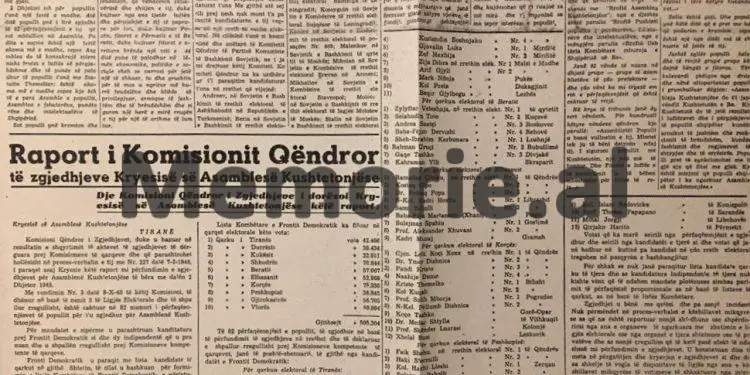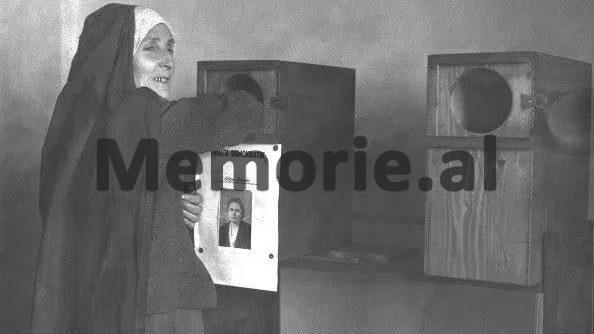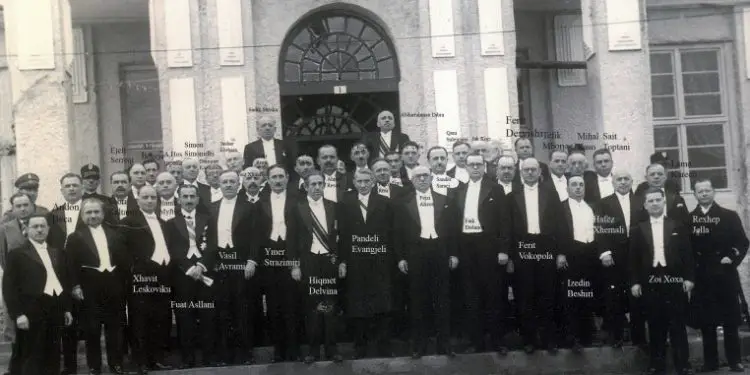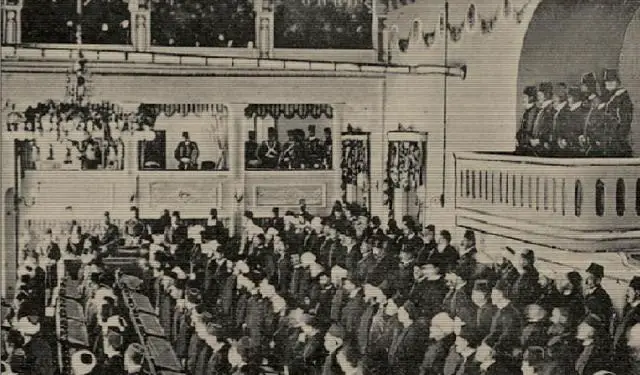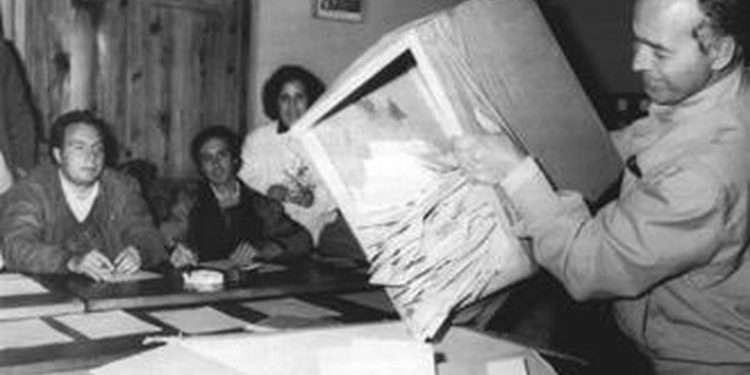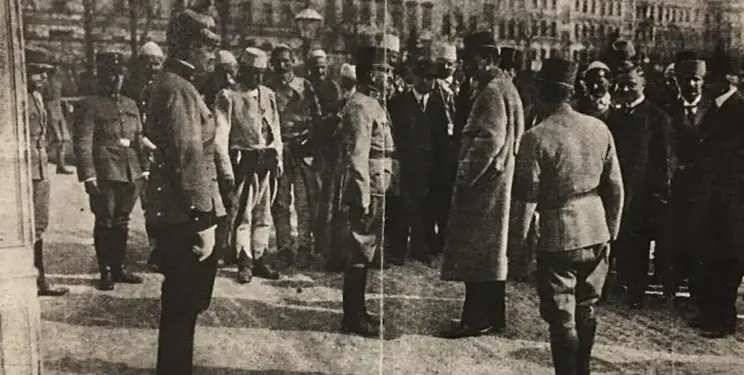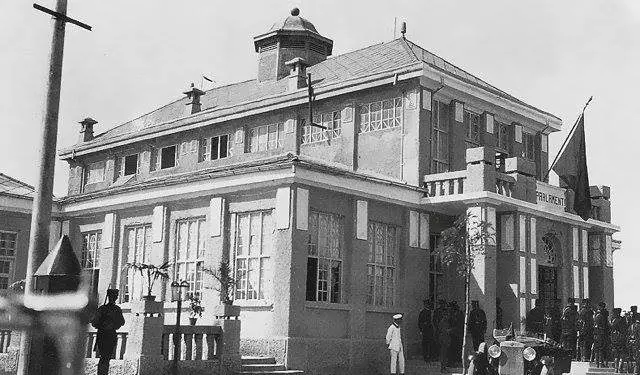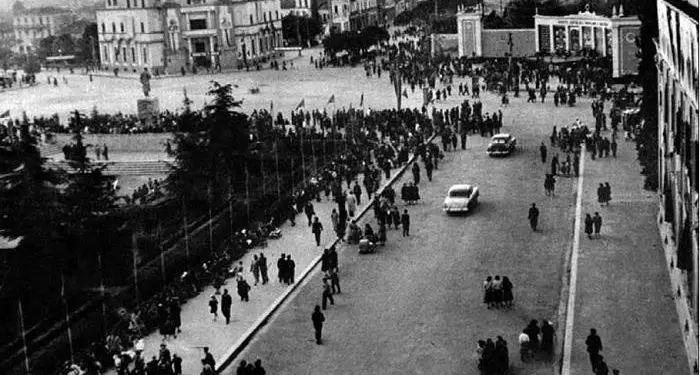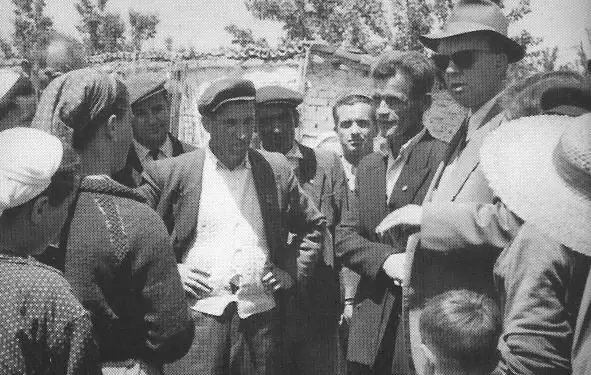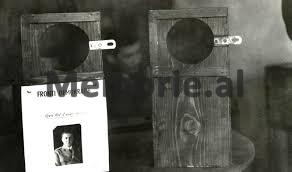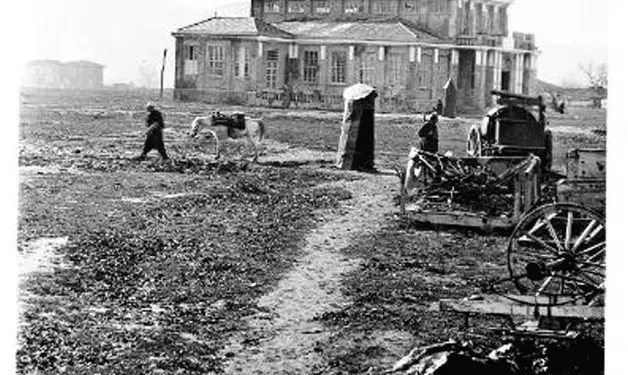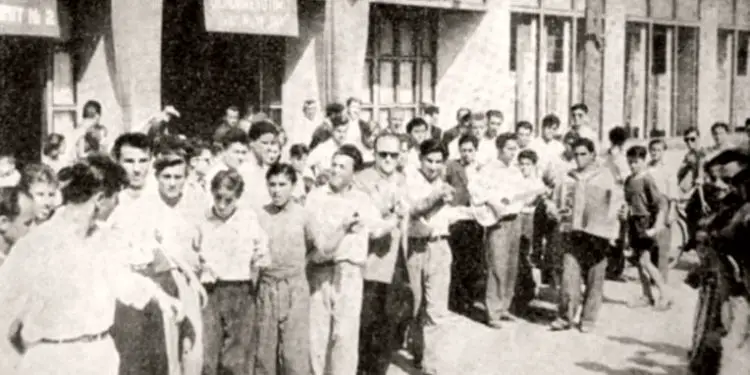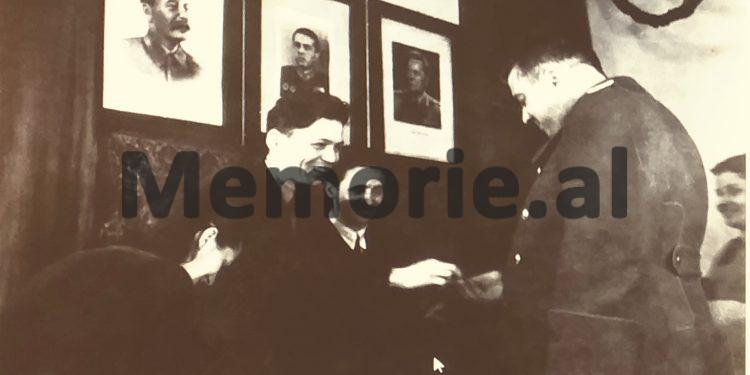Dashnor Kaloçi
Memorie.al publishes the unknown history of the elections in Albania, from the time when it was voted for the Parliament of Turkey where Albanians were represented by Ismail Qemali, Hasan Prishtina, Esad Pasha Toptani, Nexhip Draga, Rexhep Pasha Mati etc., that of the period 1921-’24: with Ahmet Zogu, Fan Noli, Padër Gjergj Fishta, Dom Ndre Mjeda, Luigj Gurakuqi, Hil Mosin, Hoxha Kadria, Ali Këlcyra, Hasan Prishtina, Mustafa Kruja, Pandeli Vangjeli, Sejfi Vllamasi, Sulejman Delvina, etc. until that of 1945, when in the Albanian Parliament took place the main leaders of the Albanian Communist Party who were represented under the Democratic Front, such as: Enver Hoxha, Abdyl Këllezi, Gogo Nushi, Beqir Balluku, Koci Xoxe, Spiro Mojsiu, Tuk Jakova, Hysni Kapo , Shefqet Beja, Sejfulla Malëshova, Nako Spiru, Koço Tashko, Haxhi Lleshi, Myslym Peza, Kristo Themelko, Gaqo Tashko, Kahraman Ylli, Liri Gega, Baba Faja Martaneshi, Enver Sazani, Kol Kuqali, Medar Shtylla, Irfan Shtylla, Irfan yogurt tandin Boshnjaku, Islam Radovicka, Riza Dani, etc. At the end of those elections where the Central Commission was chaired by the Chairman Andrea Sahatçi and the Secretary, Andrea Nathanaili, Enver Hoxha came second in the list of 108 candidates of the Democratic Front for votes against, as in the first place with more votes against, was Olga Plumbi , which from 18,242 voters in its area in Tirana, had received 2,269 votes against, while Enver Hoxha from 17,564 voters who had his constituency in Tirana, 2,151 voters had voted against him.
Of the 108 deputies of the Democratic Front who ran and won in the parliamentary elections of December 2, 1945, today after 76 years almost all have passed away. Among the only ones who lived until a few years ago, was Pilo Peristeri, one of the leaders of the First Communist Group of Korça in the 1930s, former candidate of the Politburo and Director of the Tractor Plant “Enver Hoxha”, as well as Et ‘hem Bërhani, former leader of partisan formations in the province of Mat and one of the members of the Antifascist National Liberation Council (KANÇ) chaired by Enver Hoxha. In the elections of December 2, 1945, Pilo Peristeri ran in the area of Korça where besides him also ran Koci Xoxe, Koço Tashko, Kristo Themelko etc., while Et’hem Bërhani ran in the province of Mat where he had his activity during war. Most of these former deputies have already passed away due to natural causes (old age) and a large number of them have been executed over the years by the communist regime of Enver Hoxha, after being declared “enemies of the people”. While Pilo Peristeri from old age, (died on August 5, 2009 at the age of 100), did not appear in public or in the press, his former colleague, MP, Et’hem Berhami, who also for years did not was made alive, he became known for his participation in the big rally of the Socialist Party in the opening of the electoral campaign of 2005. In that big rally that was held in the Palace of Congresses, Et’hem Bërhani greeted the attendees speaking in the main rostrum, and as a “sign of gratitude” refused to leave from there even after numerous prayers of the organizers of that electoral rally.
December 2, 1945, Enver received more votes against
At the end of the first post-war elections that took place on December 2, 1945, which were in fact not free elections because there were no candidates outside the Democratic Front, it turned out that the Prime Minister of the Albanian government, Colonel-General Enver Hoxha, who also held the functions of Chairman of the Presidency of the Democratic Front, Minister of Foreign Affairs and Defense, had received the most votes against, of all the other candidates. In fact, Enver came second in the list of 108 candidates of the Democratic Front for votes against, as in the first place with more votes against, was Olga Plumbi, who from 18,242 voters in her area in Tirana, had received 2,269 votes While Enver Hoxha out of 17,564 voters who had his constituency in Tirana (where Abdyl Këllezi, Gogo Nushi, Beqir Balluku and Olga Plumbi also competed) 2,151 voters had voted against him. These results, after being made public by the Central Election Commission headed by the Chairman, Andrea Sahatçi and Secretary Andrea Nathanaili, were also published in the newspaper Bashkimi, a body of the Democratic Front led by the Communist Party headed by Enver Hoxha.
On Sunday, April 25, at 7 am, polling stations will be opened throughout the country and the election process will take place in 100 constituencies for the Albanian Parliament, where several dozen political parties grouped in different coalitions, as well as any independent candidate, will compete to win as many of the 140 seats that its Assembly will have. What is the history of elections in Albania, in what period of time did Albanians start voting for the first time and how were the parliamentary elections organized and held from the time of Turkey until today?
Attempts at elections since 1877
The history of elections in our country or more precisely the attempts for elections have their origins from the time of the Ottoman rule when Albania was part of the Turkish Empire. One of the first Albanian deputies to be elected to the first Turkish Parliament, which opened in December 1877, was Abdyl Frashëri. But that parliament did not last long after it was overthrown by the Sultan himself, due to the start of the Russo-Turkish War. After the dissolution of Turkey’s first parliament, there were several other attempts at elections, but all failed for various reasons. The first regular elections in Albania were held only in 1908, when the Young Turks came to power in Turkey. Those elections were not direct, but by representation, or as they are otherwise known by second voters. The first parliament of Turkey was opened on December 10, 1908 and out of 266 deputies, 27 of them were Albanians elected in the four vilayets of Albania. At that time, the members of the “Union-Progress” Committee, in Turkey, which included many Albanians, were divided and grouped into three political groups. The first group was Bashkim-Përparim (Turkish-Macedonian party) with 164 deputies, of which 130 were Turks, 5 Arabs, 1 Greek and 15 Albanians, led by Hasan Prishtina, a Kosovo MP. In the second group called: Bashkimi-Liberal (Greek-Albanian party) which consisted of 45 deputies, there were 12 Albanians led by Ismail Qemali. Among the other Albanian deputies that the Turkish Parliament had at that time, were Esad Pasha Toptani, Nexhip Draga, Rexhep Pasha Mati, etc. After 1908, there were several other elections where Albanians continued to vote for their representatives in the Turkish Parliament and that lasted until 1912 when independence was declared.
Elections from 1921 to 1939
The first parliamentary elections in Albania took place in the spring of 1921, as until then they had not been held due to the First World War where Albania was included. The first Albanian Parliament was opened on April 21 of that year and the first building of the Albanian Parliament was where the Academy of Sciences is today and, in that parliament, participated 76 deputies who were elected after a relatively regular process by the nine prefectures of countries, such as: Berat, Durres, Elbasan, Gjirokastra, Korca, Kosovo, Shkodra, Vlora and that of the Albanian colony of the USA. As in the past, those elections were held with a system of representation, or as it is otherwise known with a second voter, where based on the territorial division, the representatives of each province had the right to elect their own deputy. At that time, for the first time, the candidates started to make an electoral campaign, which in many cases was followed by various newspapers that appeared at that time in some cities of Albania, such as “Taraboshi”, “Shkumini”, “Gazet e Korçës”, “National Defense”, “Light Star”, “Faith”, “Light”, “Time”, “Free Speech”, “Democracy”, etc. Among the most famous deputies who won the right to be represented in that parliament, were: Ahmet Zogu, Fan Noli, Padër Gjergj Fishta, Dom Ndre Mjeda, Luigj Gurakuqi, Hil Mosi, Hoxha Kadria, Ali Këlcyra, Hasan Prishtina, Mustafa Kruja, Pandeli Vangjeli, Sejfi Vllamasi, Sulejman Delvina etc. From 1921 to ’24 there were several other parliamentary elections and that period of time (excluding that after the ’90s) has entered the history of Albania, as the period when the freest elections took place and democratic. In the elections for the first Albanian parliament, several parties and associations competed, such as: Progressive Party, Bashkimi Society, People’s Party, etc., and most of the candidates who won the right to be represented in Parliament (28 deputies) were members of the People’s Party. directed by Fan Noli. Ahmet Zogu, Ali Këlcyra, Qazim Kokoshi, Pandeli Cale, Bahri Omari, Sejfi Vllamasi, Bajram Fevzi, etc. were also part of that political group. Later, where the political formation where most of them were from the Krahu Kombëtar society, they split and some of its deputies joined other opposing political groups. After June 1924, when the coup d’etat took place (or the “June Revolution”, as it is known from the historiography and propaganda of the communist regime before the 1990s), by fanatical forces, Albanian politicians were grouped into two parties. new ones that were created at the time. They were the Democratic-National party led by Bahri Omar and the Democratic-Radical party led by Agjah Libohova. These political groups exercised their activity until December 24 of that year when Ahmet Zogu returned to Albania. Unlike the elections that took place in the period 1921-’24, those held in the 15 years of the Zog Monarchy (1925-1939) were not multi-party, as Zog did not allow party pluralism. During that period elections were held once every five years and more than one candidate ran in different constituencies. Although it had one of the most advanced constitutions of the time and by all standards of western countries, Zog’s monarchical system lacked party pluralism. After the occupation of the country by fascist Italy in April 1939 until the end of ’44, in Albania there were no parliamentary elections, but there was a Constituent Assembly and a parliament chaired by Mihal Zallari (1943-’44), where most of the deputies had graduated from Western universities.
First elections, December 2, 1945, with ballots
The communist government of Colonel-General Enver Hoxha, which came to power at the end of November ’44, held parliamentary elections a year later, on December 2, 1945. Setting that date for the election was deemed more appropriate by the communist government, given the internal situation it was going through, as almost the entire year ’45 passed with numerous political trials, where most of the former politicians and senior officials of all Albanian governments from that of Ismail Qemali, to the most recent one under German occupation of the country. From the beginning of November of that year, the Democratic Front led by Enver Hoxha, which was in fact the Communist Party itself, through the newspaper Bashkimi and Radio Tirana, officially announced the opening of the electoral campaign, setting December 2 as the date of the elections. The election electoral bill was approved by the Antifascist National Liberation Council (ANC) and during the adoption of that law, there were heated debates. Many members of the leadership of the Front, KANÇ who were also candidates for MPs, such as Shefqet Beja, Riza Dani, Suat Asllani, Sami Qeribashi, Selaudin Toto, etc., opposed the election law, as he was ‘de facto’ only with Front candidates and left no room for other candidates to compete outside of it, let alone a real opposition. At that meeting, Gjergj Kokoshi (Minister of Education) who was also one of the strongest opponents of that bill, in protest came out of the Front and announced his candidacy as a candidate for independent MP, being the candidate alone outside the Throne in the December 2, ’45 election. In fact, the well-known lawyer Koço Dilo tried to run as an independent candidate, but after pressure from the “competent bodies” (the people of the People’s Defense Section), he withdrew his candidacy. In the elections of December 2, 1945, for the first time, the voting system was established for all citizens who had reached the age of 18 and not with representation with a second voter, as had been done until then. Their other special feature was that for the first time in the history of elections in Albania, two women were running. They were Olga Plumbi and Liri Gega. Although from the content those elections differed radically from those held in the years of the Bird Monarchy, from the form they hardly changed at all. Voting was by ballot and there were two ballot boxes in each polling station, one for Front candidates and one for those outside it. Those who voted against the Front candidates (opponents of the communist regime) were easily understood by the relevant commission, which consisted only of Front representatives, as the grains they threw in the box creaked because it was empty. Prior to the adoption of the electoral law, the American and British governments, through their representatives in Tirana, Generals Jakobs and Hodgson, asked Enver Hoxha to hold free parliamentary elections, making it the main condition for the recognition of the Albanian government by the countries of tire. This, the Americans officially asked Enver again on November 10, ’45, through Harry Fultz and Hodgson, who repeated to him that: in exchange for diplomatic representations, the Albanian government should ensure free elections and secret press, free press and election monitoring by foreign journalists. Of all the demands made to Enver Hoxha by the Anglo-American representatives, he allowed only the participation of some foreign journalists in the December 2 elections, for whom, in his capacity as Prime Minister, he gave a press conference in the premises of Hotel “Dajti”, where his government was based. A few days after the election process, the Central Election Commission, headed by Chairman Andrea Sahatçi and Secretary Andrea Nathanaili, with members: Vasil Avrami, Halim Budo, Spiro Stringa, Faik Dishnica and Xhavit Gjata, announced the voting results. Thus, according to this commission, out of 603,566 voters who were registered in the voting lists, 543,354 participated in the voting, which constituted 90.02%. Of these voters, 506,319 voted for the Democratic Front, and 36,758 votes were in the ballot box without a candidate, (i.e. against), while 277 votes were cast in the ballot box of an independent candidate. In conclusion for the Throne candidates voted 93.18% against them, 6.77% and 00.7% for the independent candidate. After the publication of these results, the Democratic Front officially announced the won elections and a Constituent Assembly was elected by the deputies, which about 40 days later, on January 11, 1945, declared Albania a People’s Republic.
Elections from ’45 to 1990
With the elections of December 2, 1945, the communist government of Tirana, headed by Colonel-General Enver Hoxha, marked the end of hopes for the holding of free and democratic elections with a legal opposition. Just a few months after those elections, a large number of those candidates or MPs who had raised their voices for free elections were arrested and brought to justice, with 17 of them being executed. Enver Hoxha did not allow party pluralism and all the elections that took place from 1945 until the end of the 80s, were only with the candidates of the Democratic Front, under whose mask the Communist Party was hiding, or the ALP as it was called after 1949. But even though it did not allow the opposition, the communist regime of Enver Hoxha continued the violence by using it against his deputies in the Democratic Front. So after ’45 until the beginning of the ’80s, many deputies of the People’s Assembly were imprisoned or executed, such as: Kadri Hoxha, Liri Gega, Dali Ndreu, Tuk Jakova, Bedri Spahiu, Haxhi Hajdari, Avdyl Këllezi , Koço Theodhosi, Dashnor Mamaqi, Kiço Ngjela, Beqir Balluku, Hito Çako, Petrit Dume, Kadri Hazbiu, Feçor Shehu, etc., not to mention many others who were forced to commit suicide. Throughout this period, although the communist regime widely propagated that voting was free, anyone who did not participate in the election, or who was dictated to have voted against Democratic Front candidates, had major consequences up to imprisonment. Although few, during the 45 years of the communist regime, there have been cases when various persons did not want to vote and never voted, such as Hamit Gjylbegu and Zija Muka from Shkodra, who were also sentenced to prison. for this reason. There have been many other cases where different people used election day by pressuring them not to vote, in order to resolve any injustices that had been done to them before, such as housing, granting study rights. for children, employment problems etc. All voting from ’45 to the end of the ’80s was done with only one candidate for MP for each constituency.
Ballots with dance and folk music
The electoral campaigns for the People’s Assembly that took place once every four years, the ALP considered as the biggest political action and made available to it all its propaganda arsenal, with radio, decor newspapers, etc. One week before the elections, the polling stations were on duty by the representatives of the Front and on election day they opened at 6 am and closed at 6 pm. Usually the opening of the polls was done with folk music by amateur or professional orchestrators who went to every polling station dropping their instruments and there the voters sang and danced for the Party of comrade Enver Hoxha. The representatives of the Front, who were also the most fanatical communists, went from house to house making propaganda that the voters should go to the polls as early as possible, so that the voting would end as soon as possible. Throughout the voting day, the Albanian Radio and TV gave the percentages of the turnout for all the districts of the country, which were in competition with each other as to who would finish them as soon as possible. Although there was a secret room in all the polling stations, no one had the courage to enter there with the ballot paper, but after the ballot paper was taken, it was immediately thrown in the box. If you entered the secret room, it meant that you would vote against the Front candidates. But there were plenty of cases where different voters entered and stripped the Front candidate of their visa, voting against or casting the invalid ballot, as they did not mark any other names because they could be dictated by their writing. This was learned at the end of the voting when they were given and their results, which were communicated through Radio, Television and the press. Throughout the history of voting (not elections, as there were only votes in that period) from the ’45s until the late’ 80s, 100% turnout was never achieved and 100 votes were never cast. % for the candidates of the Democratic Front led by the ALP.
The level of education of the deputies, from the graduates in Europe, to the distinguished tractors and millers!
If we take a look at the level of education of the deputies of the Albanian Parliament and their intellectual formation from 1921 when the first elections took place and until the beginning of the ’90s when the communist regime collapsed, we will see that that thing had an inverse. Thus, almost most of the Albanian deputies of the first parliament that emerged from the elections of April 21, 1921 were educated and graduated in the universities of Turkey and those of other European countries (mainly the western one), which continued further also during the period of the Bird Monarchy. This thing, with MPs graduating from Western universities, as “for inertia” continued with the first parliamentary elections of 1945, where under the guise of the Democratic Front, the Communist Party elected several figures such as: Omer Nishani, Shefqet Beja, Selaudin Toto, Koço Tashko, Dr. Medar Shtylla, Dr. Enver Sazani, Prof. Skënder Luarasi, Dr. Sezai Agalliu, Ing. Spiro Koleka, Dr. Ymer Dishnica, Gaqo Tashko, Prof. Selim Mborja, Andrea Sahatçi, Kostandin Boshnjaku, Gjovalin Luka, etc. But in the years that followed, the level of education of deputies in the People’s Assembly of Albania steadily declined, and in the late 1980s (with some rare exceptions), not only was there no deputy to graduate abroad. , but also at the University of Tirana were counted “with grains” graduates. Under the slogan “Working class party”, Enver Hoxha filled the Albanian Parliament with uneducated deputies who came from the working class where they excelled in their professions, such as: Gjela Biba, Shefqet Peçi, Pali Miska, Lenka Çuko, Hekuran Isai, Simon Stefani, etc., where most of them were appointed to the positions of ministers, members of the Politburo and as Secretaries of the Central Committee of the ALP. Memorie.al




